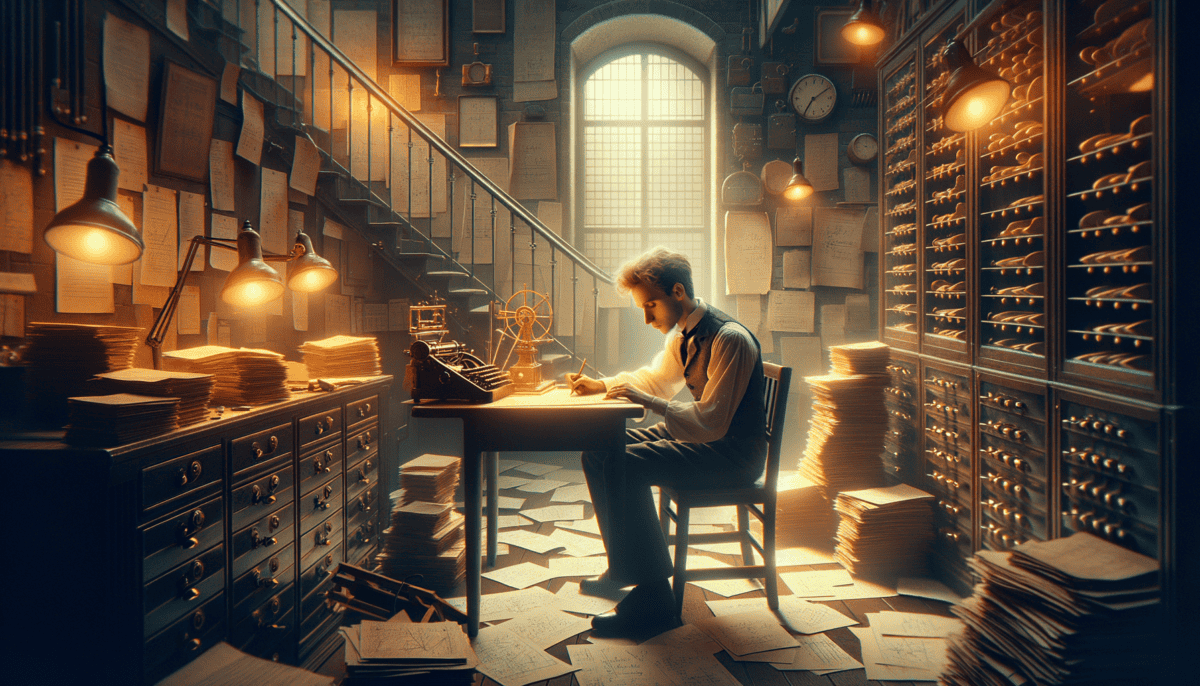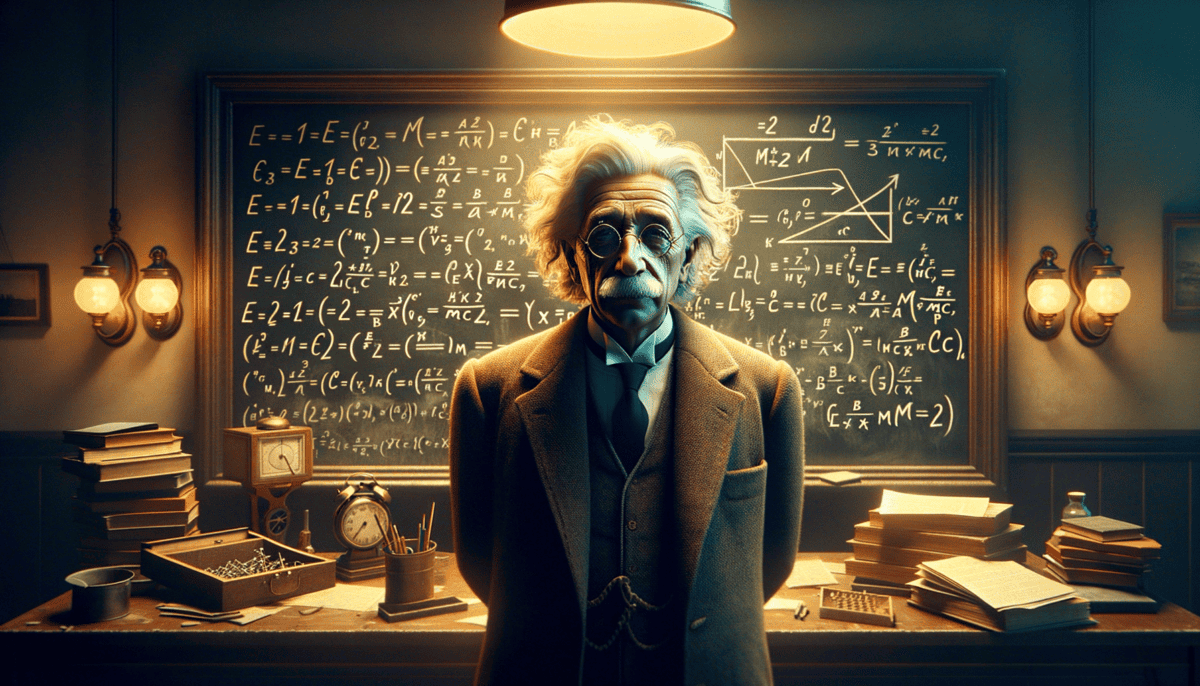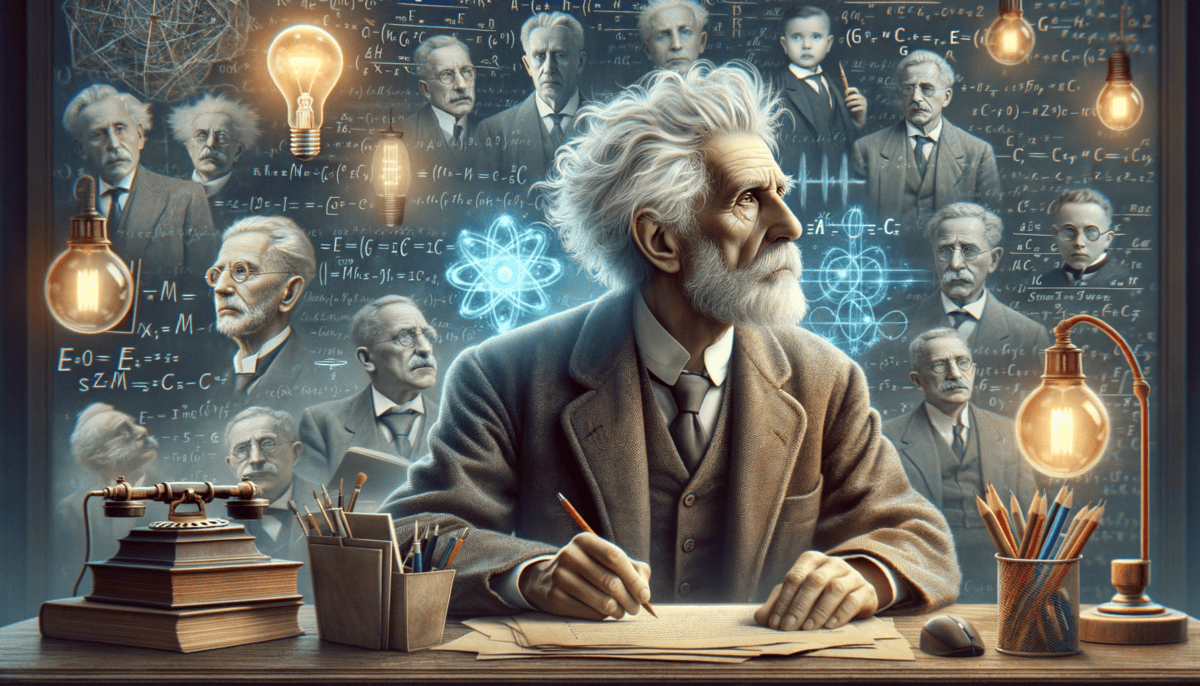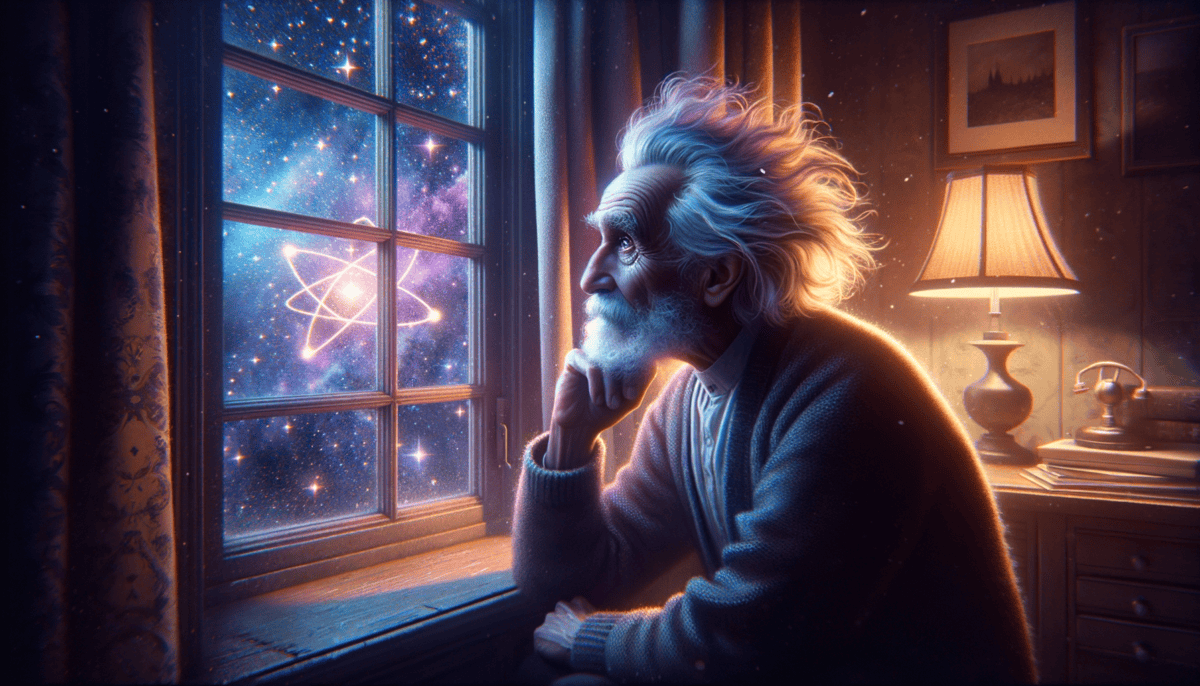A Special Gift
In a small German town called Ulm, on a cold winter day in 1879, a baby boy named Albert Einstein was born. His parents, Hermann and Pauline, smiled as they looked at their new son. Little did they know that this tiny baby would grow up to change how we see the whole world!
"Look at his head," whispered Pauline, gently touching Albert's unusually large head. "It's shaped differently."
Hermann held his wife's hand and said, "He's perfect just the way he is."
Young Albert was different from other children. While most kids his age were running and playing, he liked to sit quietly and think about things. He would stare at his father's pocket compass for hours, amazed by how the needle always pointed north.
"But why does it always point that way?" little Albert would ask, his eyes wide with wonder.
His father would smile and say, "There's magic in the world, Albert. Sometimes we just have to look for it."
Fun Fact: Albert didn't talk until he was almost 4 years old! His parents were worried, but when he finally started speaking, he could say complete sentences.
When Albert was five years old, something amazing happened. He was sick in bed, and his father brought him a compass to play with. This simple gift changed everything!
"Papa, what makes the needle move?" Albert asked, his voice full of excitement.
"There are invisible forces in nature, my son," his father explained.
This made Albert even more curious. He started to think about all the invisible things that might exist in the world.
Some things that made Albert special:
- He loved to solve puzzles
- He asked lots of questions
- He thought about things differently than other people
- He never gave up when something was hard
Albert didn't always do well in school. His teachers didn't understand why he asked so many questions. But his mother believed in him. She got him a violin, and Albert discovered he loved music almost as much as he loved science!
"Music helps me think," he would say while playing his violin by the window.
As Albert grew, his mind grew too. He thought about light, space, and time in ways nobody had ever thought before. He imagined riding on a beam of light and wondered what he would see.
His sister Maja was his best friend. They would spend hours talking about their dreams and ideas. "You see the world in a special way, Albert," she would tell him.
One day, when Albert was struggling with his math homework, his uncle Jakob visited. He showed Albert how math could be like a fun game. This helped Albert see that even hard things could be interesting if you looked at them the right way.
"Remember, Albert," his uncle said, "the most important thing is to never stop questioning."
Those words stayed with Albert forever. His curiosity about the world around him only grew stronger as he got older. He kept asking questions that nobody had ever asked before, and this would lead him to make some of the most important discoveries in science.
The little boy who stared at a compass would grow up to show us that time and space weren't what we thought they were. But for now, he was just Albert – a curious child who saw wonder in everything around him.
Dreams and Discoveries
The sun peeked through the windows of the Swiss Patent Office, where a young Albert Einstein sat at his desk. It was 1905, and he was now 26 years old. While other workers busily stamped papers, Albert’s mind wandered to bigger questions about the universe.
“Einstein! Pay attention to these patent applications!” his boss called out.
Albert smiled and nodded, but his notebook was filled with drawings and equations that had nothing to do with patents. He was thinking about something much bigger – how light moves through space.
Special Note: 1905 would become known as Albert’s “Miracle Year” – when he made amazing discoveries that changed science forever!
Every day after work, Albert would rush home to his wife Mileva and their young son Hans Albert. Their small apartment wasn’t fancy, but it was filled with books and dreams.
“What did you think about today?” Mileva would ask as they sat down for dinner.
“I imagined riding on a beam of light,” Albert replied, his eyes sparkling. “If I could travel that fast, what would time look like?”
These were the kinds of questions that filled Albert’s mind. While working at the patent office, he wrote important papers about:
- How light behaves like both waves and tiny particles
- Why atoms are real (even though we can’t see them)
- What happens when things move very, very fast
- How energy and matter are connected (E=mc²)
Albert worked during the day and did his science at night. Sometimes he would get so excited about an idea that he would wake Mileva up to talk about it.
“Look!” he would say, showing her his calculations. “The faster something moves, the slower time goes!”
Most people didn’t understand Albert’s ideas at first. Some scientists even laughed at them. But Albert didn’t give up. He knew he was onto something important.
One day, while walking home from work, Albert saw his friend Michele Besso:
“Michele!” Albert called out. “I solved it! Time isn’t the same everywhere – it changes depending on how you’re moving!”
This was part of what would become his Special Theory of Relativity – one of the most important ideas in all of science.
Albert finally got recognition for his work when other scientists began to understand his ideas. Universities started to notice him, and soon he wouldn’t need to work at the patent office anymore.
But even as his fame grew, Albert stayed humble. He still played his violin, still asked questions, and still wondered about the mysteries of the universe.
“The important thing,” he would say, “is to never stop asking ‘why?'”
Every night, before going to bed, Albert would look up at the stars through his window. The same curiosity that made him stare at his father’s compass as a child now drove him to unlock the secrets of the universe.
The quiet patent clerk was becoming one of the world’s most famous scientists, but he was still the same Albert – always dreaming, always wondering, always imagining new possibilities.
A New Theory Changes Everything
The year was 1915, and Albert Einstein was hard at work in Berlin. His wild hair stuck out in all directions as he scribbled equations on paper. He hadn’t slept much – he was too excited about his new idea about gravity!
“The universe is like a giant trampoline,” Albert explained to his friend Marcel Grossmann. “Heavy things make dips in space, just like you make a dip when you sit on a trampoline!”
Marcel looked puzzled. “What do you mean, Albert?”
“Watch this!” Albert grabbed an orange and rolled it on his curved desk calendar. The orange followed the curve, just like planets follow curved paths in space.
Fun Fact: Albert called this his General Theory of Relativity – it was a whole new way of thinking about gravity!
But not everyone believed Albert’s new idea. Some scientists shook their heads and said, “That’s impossible!”
Albert knew he needed proof. “If I’m right,” he said, “light from distant stars will bend when it passes near the Sun.”
There was just one problem – you can’t see stars during the day because the Sun is too bright!
The Big Test
Then Albert had a lucky break. In 1919, there would be a special total solar eclipse. During the eclipse, the Moon would block the Sun’s bright light, making stars visible in the daytime!
Two teams of scientists traveled far away to take pictures during the eclipse:
- One team went to Brazil
- Another team sailed to an island off Africa
- They took special telescopes and cameras
- They hoped to see if starlight bent around the Sun
On May 29, 1919, the sky grew dark as the Moon covered the Sun. The scientists quickly took their pictures. Would they prove Albert right?
Months later, the results came in. Albert sat nervously as scientist Arthur Eddington stood up to speak.
“Ladies and gentlemen,” Arthur announced, “the stars appeared exactly where Einstein predicted they would be. His theory is correct!”
The room erupted in applause. Albert smiled quietly. His mathematical “trampoline” idea about space was real!
Newspapers around the world printed big headlines:
“EINSTEIN’S THEORY TRIUMPHS!”
“NEW THEORY OF UNIVERSE CONFIRMED!”
Almost overnight, Albert became famous. People everywhere wanted to meet the scientist who had figured out a new law of nature. But Albert stayed humble:
“Nature,” he said, “is showing us just a tiny bit of her secrets.” ✨
Teachers asked him to explain his theory to students. Albert thought for a moment, then said:
“Put your hand on a hot stove for a minute, and it seems like an hour. Sit with a pretty girl for an hour, and it seems like a minute. That’s relativity!”
The discovery changed how we think about space, time, and gravity. Scientists still use Albert’s theory today to understand black holes, GPS satellites, and the history of our universe.
But for Albert, this was just the beginning. There were still so many mysteries to solve, and the world was about to face challenges that would need more than just scientific answers.
Escape from Darkness
The streets of Berlin felt different in 1933. Dark clouds hung over Germany as Adolf Hitler rose to power. Albert Einstein watched with growing worry as his beloved country changed. ️
“Something terrible is happening,” Albert told his wife Elsa one morning. “They are treating Jewish people very badly.”
Even though Albert was world-famous, he wasn’t safe. The Nazis didn’t like Jewish scientists or their “Jewish physics.” They burned books and threatened anyone who was different.
“I cannot stay in a country where people are not treated equally,” Albert declared.
A Brave Decision
One cold January morning, while Albert was visiting America, he made a big choice. “We cannot go back to Germany,” he told Elsa over the telephone. “It’s not safe anymore.”
Elsa understood. She quickly packed their most important things and left their Berlin home forever. Some kind friends helped her escape to America, where Albert waited.
In America, Albert found a new home at Princeton University. The building had ivy growing on its walls and friendly faces inside. But his heart was heavy, thinking about the people still in danger back in Europe. ❤️
Speaking Up for Others
Albert knew he had to use his famous name to help others. He wrote letters to important people, asking them to help refugees escape from Nazi Germany. He spoke to big crowds about treating all people with kindness.
Sometimes at night, Albert would play his violin and think about his old life in Germany. The music helped him feel better when he was sad.
“Life is like riding a bicycle,” he often said. “To keep your balance, you must keep moving forward.”
A New Warning
In 1939, Albert learned something scary. Scientists in Germany were working on a super-powerful weapon using something called atomic energy. He knew how dangerous this could be.
With shaking hands, Albert wrote a very important letter to President Franklin Roosevelt:
Dear Mr. President,
I must tell you about a new type of very powerful bomb. We must make sure it doesn’t fall into the wrong hands.
The President took Albert’s warning seriously. This letter would change history, though not in the way Albert hoped.
Hope for Peace
Even during these dark times, Albert never lost his gentle spirit. He still solved puzzles about the universe. He still helped young students learn about science. And most importantly, he spoke up for peace and kindness.
To the students who visited him at Princeton, he would say: “Remember to stay curious about the world, but always use your knowledge to help others.”
Albert’s courage during these hard years showed that being smart wasn’t enough – you also had to be brave and stand up for what was right.
As storm clouds gathered over Europe and a world war approached, Albert continued his work. But now he carried a new responsibility: using his voice to protect others and fight for peace.
A Time of Hard Choices
The year was 1942, and Albert Einstein sat in his cozy Princeton office, his wild gray hair catching the morning sunlight. The world was at war, and his famous letter to President Roosevelt had started something big – the Manhattan Project.
The Big Secret
“Professor Einstein,” a young scientist knocked on his door one morning. “They’re building it – the atomic bomb. Your letter helped make it happen.”
Albert’s heart felt heavy. He had warned about the bomb to keep it away from the Nazis, but now it was becoming real. He tugged at his mustache, thinking hard about what he had done.
“Sometimes our actions have bigger effects than we expect,” he whispered to himself.
Working for Peace
Even though Albert wasn’t part of building the bomb, he couldn’t stop thinking about it. He spent many nights looking at the stars through his window, wondering if he had made the right choice.
Important Things Albert Did During This Time:
• Wrote letters asking for peace
• Helped other scientists who escaped from Europe
• Taught students about using science for good
• Spoke up against war
“We must use our minds to help people, not hurt them,” he told his students at Princeton. He would often play his violin to help clear his thoughts.
A Scientist’s Worry
One summer day in 1945, Albert heard the news – atomic bombs had been used on two cities in Japan. His face grew sad as he learned about all the people who were hurt.
“If I had known what would happen,” he told his friend, “I would have been a watchmaker instead of a physicist.”
“Now more than ever,” Albert declared, “we must work for peace. Science should bring people together, not tear them apart.”
Teaching Others
Albert started spending more time teaching young people. He wanted them to understand that being smart means being responsible too.
“Dear students,” he would say, his eyes twinkling behind his round glasses, “remember that knowledge is powerful. We must use it wisely and kindly.”
He wrote many letters to world leaders asking them to stop making atomic weapons. His voice became strong for peace and understanding between all people.
Hope for Tomorrow
As Albert walked through Princeton’s peaceful campus, he thought about the future. The world had changed so much since his days as a young patent clerk in Switzerland.
“Maybe,” he said to a student walking with him, “the same clever minds that learned to split the atom can also find ways to bring people together.”
Every evening, Albert would look at a picture of Gandhi on his wall and smile. Both men believed in solving problems without fighting. They knew that peace was the smartest choice of all. ️
Even when things seemed dark, Albert kept his hope alive. He knew that just as the universe held endless mysteries, people held endless possibilities for doing good.
A Legacy of Light
Princeton, 1955. The cherry trees were blooming outside Albert Einstein’s modest home. At 76 years old, his wild white hair was as untamed as ever, and his eyes still sparkled with curiosity.
Sharing Wisdom
Albert spent his final days doing what he loved most – thinking about the mysteries of the universe and sharing his ideas with young minds.
“The important thing,” he told a group of students visiting his home, “is to never stop asking questions. Curiosity has its own reason for existing.” ✨
His office was filled with papers covered in equations and drawings. On the wall hung his favorite pictures: one of Newton, one of Maxwell, and a beautiful photo of the stars.
Simple Pleasures
Despite being world-famous, Albert lived simply. He loved sailing his little boat, playing his violin, and taking long walks while thinking about the universe.
• Showing that imagination is as important as knowledge
• Teaching us to question everything with kindness
• Proving that one person’s ideas can change the world
• Reminding us to use science to help people
Final Thoughts
“Would you do anything differently?” a young reporter asked him one spring morning.
Albert smiled and adjusted his cozy sweater. “I would spend more time playing with children,” he answered. “They understand the true meaning of wonder.”
A Lasting Light
On April 18, 1955, Albert Einstein’s amazing journey on Earth came to an end. But his ideas continue to shine like bright stars in the night sky.
Today, scientists use his theories to understand black holes, build GPS systems, and explore the farthest corners of space. Children learn his name and feel inspired to ask their own big questions.
“Life is like riding a bicycle,” Albert once said. “To keep your balance, you must keep moving forward.”
The Dream Lives On
Whenever someone looks up at the stars and wonders about time and space, Albert’s spirit lives on. When a child asks “why?” or “how?” they follow in his footsteps.
His desk in Princeton remains just as he left it – a reminder that the greatest discoveries often come from simple curiosity and big dreams.
Every year, new scientists make discoveries using Albert’s ideas. Like ripples in a pond, his thoughts continue to spread, touching new minds and inspiring fresh questions about our amazing universe.
And somewhere, perhaps, Albert Einstein is still riding his bicycle through the cosmos, smiling at all the wonderful mysteries yet to be solved.






